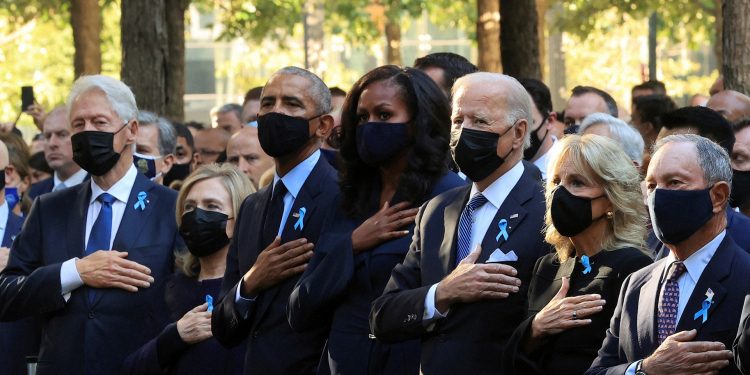As the USA observed the 20th anniversary of the 9/11 attacks on the symbols of America’s might by Al-Qaeda through a series of airstrikes that the world had never thought possible, US President Joe Biden did not utter a single word at the official programme September 11, but stood side by side with three of his predecessors bowing his head. His silence and a video release said it all. Things are back to square one and history is repeating itself with perhaps renewed vigor and also glory for the perpetrators of violence. The flag of the terrorists, who aided and abetted the 9/11 attacks is once again fluttering in Afghanistan, mocking at the longest multi nation US led war on terror waged to root them out. The Taliban, who gave shelter to Al-Qaeda terrorists and helped them launch their deadly attack on the USA, have now gained direct support from countries like China, Russia, Iran and Pakistan as also some top international players with whom they are negotiating mutually beneficial deals. American memory might wane about the nearly 3,000 lives that had been lost on that fateful day 20 years ago or even about the Americans and their local collaborators who lost their lives in the Afghan war but it is the rest of the world, and especially India, that has to worry about the cessation of the US’ avowed battle against terror.
A recent statement by Tony Blair, Prime Minister of the United Kingdom from 1997 to 2007, sounds ominously relevant for India and the world today. Blair says “Radical Islam believes in not only Islamism-the turning of the religion Islam into a political doctrine-but in the justification of struggle by armed means, if necessary, to achieve it. Islamism is a first-order threat to the security of open, modern, culturally tolerant societies. Its defeat, like that of revolutionary communism, ultimately will come through confronting its violence and ideology with a combination of hard and soft power.”
The lesson from the US withdrawal from Afghanistan for India is that it has to, henceforth, make independent decisions and fight its own battles not only against cross-border terrorism but also increased internal security threats emanating from religious fanaticism that is bound to grow within.
No other event of the 21st century had changed international politics the way 9/11 did. The irony is that even after trillions of dollars were spent and thousands lost their lives during the past two decades to bring to book the perpetrators, the world is yet again confronted with the same political, economic, and social consequences of that history defining moment. The stated missions remain unaccomplished. The USA declared its war on terror with the aim to unite itself, break the back of the attackers and teach them a lesson of a lifetime. Most democratic and free countries from across the globe pitched in with the US. Many did so with armed forces while others, like India, contributed in rebuilding a shattered Afghanistan. But, the US today seems even more divided and hatred and racial intolerance have virtually vertically split the nation. Even on the day marking the 20th anniversary the tell-tale fissures in American society and political class became glaringly visible. Former President Donald Trump, who had authorised inking the deal with the Taliban in 2020 to withdraw US troops by May, 2021, used a programme on the same day to lambast President Biden for the manner in which he had handled the pullout and claimed he would have done a better job had the US voters re-elected him. He termed the pullout “gross incompetence.”
His remarks triggered a sharp reaction from fellow Republican and former President George W Bush, who regretted America’s current political turmoil and attacked those who threatened or carried out violence at home. This was a clear reference to the January 6 violence at Capitol Hill by Trump followers instigated by his hate-filled speech during the declaration of the Presidential poll results. Bush’s words left no one in doubt about the target of his attack when he said the USA has seen “growing evidence that the dangers to our country can come not only from across borders, but from violence that gathers within.”
Whatever Trump may have said, it’s also true that Biden’s withdrawal of US troops from Afghanistan does not signal the end of the war on terror anytime soon. With the US out of the struggle, it is time for the rest of the world to take stock and act. In fact, the spectre of a new cycle of violence and terror is looming larger now with the return of the Taliban to power in Afghanistan. Add to this its festering Kashmir problem, India has to be extra cautious because it can ill afford to depend on any one else to fight its battles in the coming times.






































